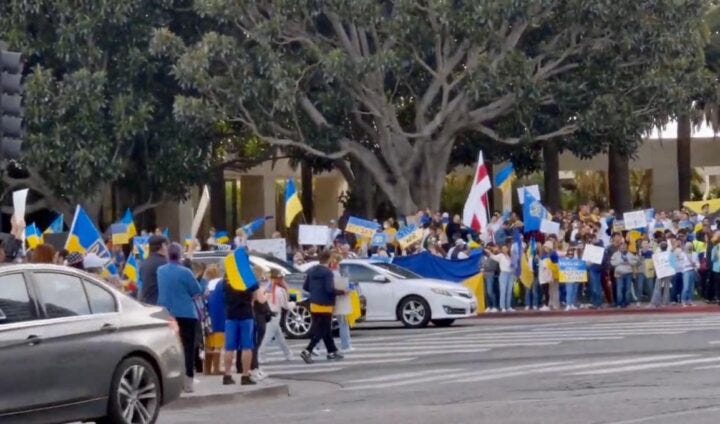CSUSB community feels the impact of Russia’s invasion in Ukraine
John Rivera wrote this article for Cal State San Bernardino’s Coyote Chronicle. It is available for republication or reference. If you think their work is important, you can support it here.
As the world reacts to Russia’s invasion of Ukraine, the CSUSB’s diverse community with members from both the Ukraine and Russia have continually been impacted by the war.
Though from Belarus (a country bordering both Ukraine and Russia), CSUSB Professor of Political Science, Luba Levin-Banchik, and her Ukrainian husband, have expressed concern about the impact and future of Ukraine.
“I wasn’t able to sleep all night when I heard of the invasion in the news,” Professor Levin-Banchik said. “It’s clear that if Putin takes over Ukraine, the people will lose hope and they will lose a lot of freedoms. The freedom of expressing what is on their mind. The freedom of speaking in public. The freedom of choosing their leaders and criticizing leaders — that’s an important part of democracy.”
In an earlier interview with KESQ TV Palm Springs, Professor Levin-Banchik indicated that the war between Russia and Ukraine was inevitable given the differences in the two countries’ opinions and capabilities. Accordingly, she argued that both countries distrusted one another even when their statements were genuine and honest. “There is a need to rebuild trust if the two countries are to maintain peace,” said Professor Levin-Banchik
Professor Levin-Banchik indicated that Americans should be concerned about the situation. “We should be concerned about what is happening in Ukraine because, in one way or the other, we are all connected. The break from the normal flows of events have a direct impact on our economies, but most of all, we should be concerned about everything that is happening in the world, for example, China and Taiwan…and it is wrong for the media to highlight one event and ignore the other,” she contended. In a similar event, Somalia is suffering similar invasions but with little attention from the media.
Despite the coverage, little is known about what exactly is happening in the two countries and how the people with direct connections are feeling about the situation. In addition to CSUSB community members from Ukraine and Russia, Southern California is a host to more than 26,000 experts from Ukraine who believe that the current war between the two countries will not just result in a humanitarian crisis, but a divided people who, for a long time, have maintained family ties in both countries. Olga Grigoryants a journalist with the LA Daily nation, and an expert in Russian and Ukrainian politics interviewed some of the affected. In her Twitter feeds, Grigoryants reports the following accounts:
“When my parents immigrated, it was the U.S.S.R,” So it was one culture, cuisine, family values, and beliefs.” Says Rina Atroshenko, 54 the owner of Traktir restaurant in Tarzan. “Therefore, “I would rather talk about the food and where that’s divided,” she said. “This is more Russian. This is more Ukrainian, but that is all the same culture and same cuisine, just a little different recipe. I believe everybody wants to do the same thing, everybody wants peace.”
At first, Atroshenko argued that the invasion seemed like a bluff. “No one there actually believes that anything is going to happen. I think it seemed more like the U.S. was trying to divide Russia and Ukraine,” she said.
For Alexander Gurfinkel, a 32-year-old software engineer who moved from Ukraine as a child and now lives in West Hollywood, the division is energy-draining to both the Russians and Ukrainians.
“I just wish for the world that was as calm as 2014 was,” Gurfinkel said. “If we can get back to that level of calm, I’d love that to happen. I’d love this whole event to stop escalating and everybody to calm down, but in my opinion, with Putin, you never know what happens next.”
Further, Olga Grigoryan received mixed reactions when asking how Russia can support Putin after everything that is happening in Ukraine.
“I worry that you believe the Western propaganda. It’s important to remember that the major national TV networks are either state-run or owned by companies with close links to the Kremlin,” says Grigoryants.
Other respondents believe that the war is necessary to end the long ongoing conflicts between the two countries.
Essentially, the conflict between the two countries ignited in 2014 when the former Ukrainian President, Yanukovych was ousted from his office after a violent stand-off with pro-European protestors in Kyiv. The divisions gave an opportunity for Russia to occupy the Crimean Peninsula, which later declared Donetsk and Luhansk People’s Republics.


